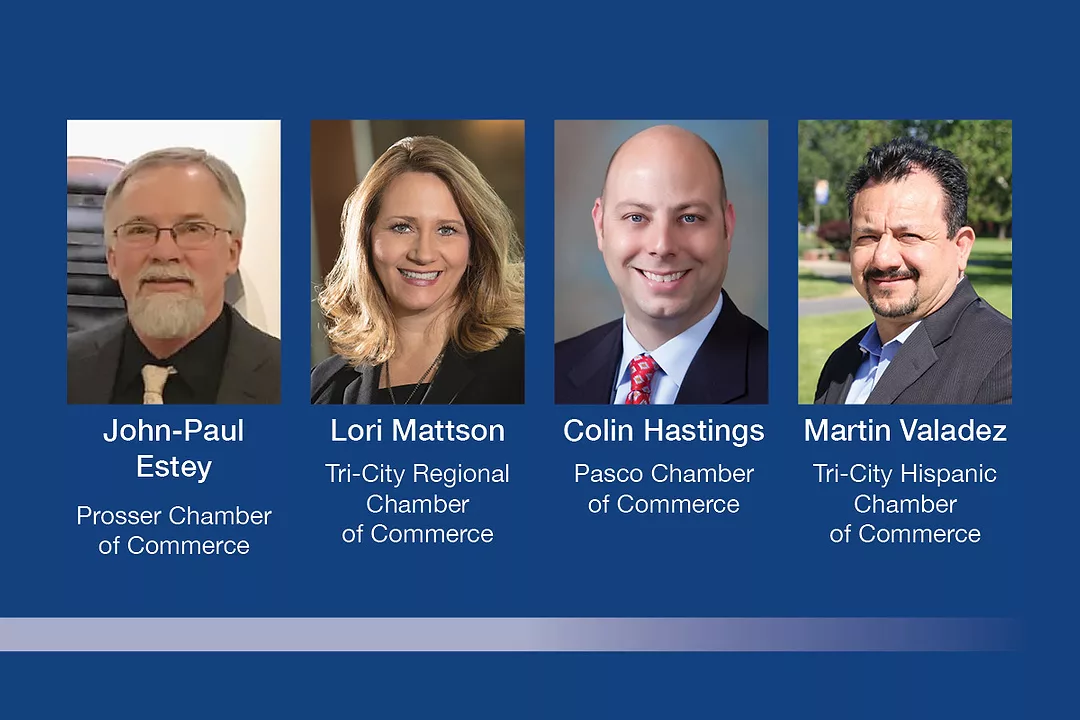
Home » Cheering through the pain: Business groups lose members but not focus
Cheering through the pain: Business groups lose members but not focus

January 14, 2021
As members of the Prosser Chamber of Commerce struggled to pay renewal fees under pandemic-related financial pressure, the executive director found a novel solution.
John-Paul Estey asked Yakima Federal Savings and Loan to allow it use sponsorship dollars for canceled events to cover dues owed by cash-strapped members.
The bank agreed. Yakima Federal was on tap to foot the entertainment bill for two key Prosser chamber events. But the Scottish Fest & Highland Games in June and the Prosser Art Walk & Wine Gala in July were both canceled, leaving the sponsorship dollars unspent.
Spokesman Paul Crawford noted the money was budgeted to support the community. So, it cut a check for $2,500.
“It made a lot of sense to help these businesses who were struggling,” he said. “These events aren’t about Yakima Federal.”
The money helped the chamber continue its mission, which is to support business and the community. Among its many events, it organized street closures to facilitate outdoor dining, which proved popular to retailers as well as restaurants, Estey said.
The Prosser chamber is not unique. Chambers of commerce and other membership-based business groups are being squeezed by the same economic forces squeezing their members – a pandemic that has resulted in massive economic disruption.
Mid-Columbia chambers spent 2020 organizing campaigns to help members pivot to new business lines. They’ve organized pro mask campaigns and helped government agencies dole out grants under the CARES, or Coronavirus Aid Relief and Economic Security, Act. They’ve helped companies upgrade websites and navigate launching takeout and delivery services.
But just like their members, they have bills to pay and their missions are jeopardized by falling revenue.
Membership levels are dipping across the region, say chamber leaders and their colleagues at the Mid-Columbia’s visitor bureaus, economic development organizations and historic downtown associations. They’re taking a long view and pressing ahead with business-friendly initiatives, while taking steps to keep their own books in the black.
About 100 members have dropped out of the Tri-City Regional Chamber of Commerce over the course of 2020, leaving it with about 1,000 members in December, said Lori Mattson, president and chief executive officer.
In March, lapsing members started citing Covid-19 as the reason for not renewing. Normally, business owners drop out when they close their doors or sell to new owners, she said.
The lapsed members represent the pandemic’s hardest-hit industries: Restaurants, breweries, wineries, event centers, fitness centers, recreation facilities and small businesses that rely on face-to-face contact.
“We’re just trying to work with people if they need us. Even if they can’t pay, we’re still here. There’s a lot of things we do that don’t require a membership,” she said.
Membership dues represent about half the Tr-City chamber’s annual revenue. It earns the other half from fees generated by programs, events and seminars accounts for the rest.
It cut expenses and found new revenue sources, including administrative fees, to facilitate CARES Act grants on behalf of Franklin County and sponsors for activities that previously were not sponsored.
“We are kind of disrupters,” Mattson said. “It’s the culture of our organization to do new things. No one knew this was going to happen a year ago, but we were as ready as we could have been.”
About 50 members of the Tri-Cities Hispanic Chamber of Commerce in Pasco did not renew in 2020, said Martin Valadez, president.
Valadez said it was a significant budget hit. Still, the Latino-focused chamber expanded its mission with contracts from the Washington Department of Commerce and Benton County to administer CARES Act grants directed at underrepresented businesses. Valadez hopes the loss will prove temporary.
“It is a challenge, and I will be reaching out to those companies/organizations this month to hopefully re-engage them as members,” he said.
Stephanie Button, executive director of the Historic Downtown Kennewick Partnership, started 2020 on a mission to beef up membership, which had been in decline.
The pandemic upended that plan, but it did not upend the group’s focus on promoting downtown Kennewick, the area between the blue and cable bridges.
Membership dues are important. They pay for media buys and support events. But it is not pushing the issue. It is pressing on with its community-building activities, demonstrating its value to current and potential members.
“We want businesses to become members. It’s our foundation, but we know times are tough,” she said, “Not being a member doesn’t mean you’re not part of our community.”
Button said 78% of members renewed in 2020 while new memberships rose by about 6%. The 2021 renewal season kicked off in January, with dues ranging from $200 for businesses and property owners to $50 for individuals and area residents.
Her goal is to retain 80% to 85% of members. She knows some will not be able to do so in early 2021, so she will reconnect with those who lapse later in the year.
“It’s a mixed bag for us right now,” she said.
The Pasco Chamber of Commerce reports its membership remained steady through 2020. Colin Hastings, executive director, is grateful but noted there is a caveat: Most members renewed in January, before the pandemic hit in force.
He is optimistic membership will stay strong through the 2021 renewal season, calling membership an investment in the community.
“They like to support our cause. They’re not looking for a return on their investment,” he said.
When the pandemic first struck, the Tri-City Development Council offered members the option to defer their memberships a year. Karl Dye, president and CEO, said the result is about a 3% decline in membership.
The region’s economic development and diversification entity reduced staff and pursued local, state and federal resources to help it adapt to the changing rules around reopening the economy.
“We want to be stronger when we come out of Covid,” Dye said.
Local News
KEYWORDS january 2021





